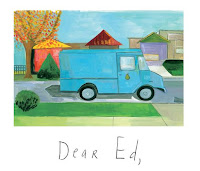by Marcus Sedgwick
Roaring Brook Press | 2013
Marcus Sedgwick’s newest YA novel revels in the dark, the
devious, and the destined. Through a series of seven connected but wholly
individual tales, the story travels from the year 2073 into the past of
long-ago times unknown.
The work begins with a young man, Eric Seven, taking an
investigative trip to Blessed Island, where it is rumored that the inhabitants
live forever. Despite this obviously science-fiction beginning, the story moves
and changes to incorporate realistic fiction, fantasy, and horror in the seven
different tales of Blessed Island. Within this one novel, a reader will find
Romeo-and-Juliet-like love, a thirsty vampire, a reenactment of the Cain and
Abel tale, magical potions, historical connections to WW II, and a tormented
artist.
The chapters are short and the writing style simple, creating
a read that is both inviting and dangerous—the reader will find herself
desperately moving forward while the staccato rhythm of the writing brings to
mind the pounding of ancient war drums. The constantly shifting protagonists
make it difficult to catch your breath but, as it becomes clear how beautifully
and intimately they’re connected, you might be able to regain your footing. This
is a story of blood, and beauty; of death and destiny; of fear, and (finally)
of love.
Read this book. And make sure you set some time aside for it
because, once you start, you will not stop until those drums silence.
REVIEWER BIO: Siân Gaetano is, before all else, a reader. She is currently pursuing an M.A. in Children’s Literature at Simmons College (to be finished in Summer 2013) and working evenings serving the good people of Boston food and beverage. She was an editorial intern at Charlesbridge for the Fall 2012 semester, and is currently an intern at The Horn Book.
REVIEWER BIO: Siân Gaetano is, before all else, a reader. She is currently pursuing an M.A. in Children’s Literature at Simmons College (to be finished in Summer 2013) and working evenings serving the good people of Boston food and beverage. She was an editorial intern at Charlesbridge for the Fall 2012 semester, and is currently an intern at The Horn Book.
























